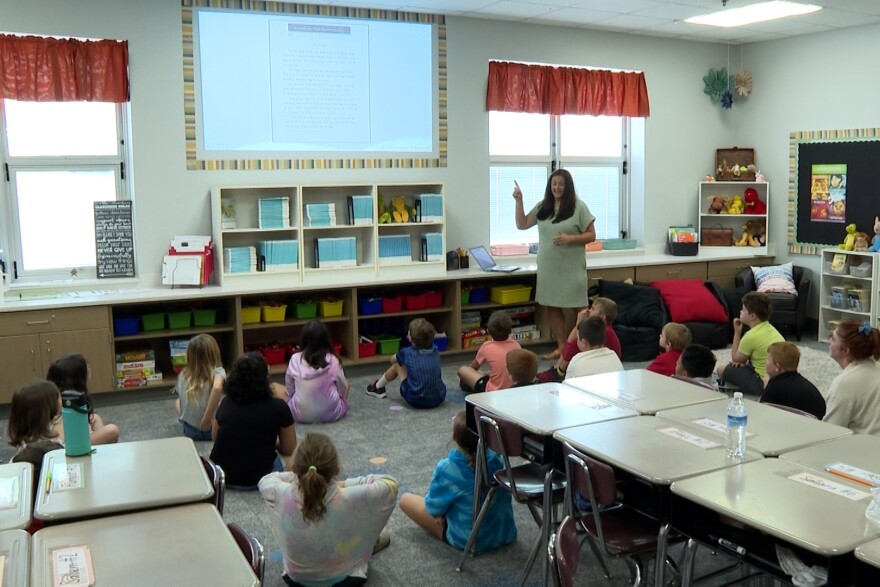Edgewood Intermediate School third grade teacher Deborah Tanner said teaching kids literacy has as much to do with showing up for her students and making reading fun as it does with science-based literacy education.
“I go watch their football games, or watch them cheer, play baseball, and it's not about a test score,” Tanner said. “So when I tell them, ‘You're going to do this and you're going to kill it,’ they believe me and they give it everything they've got.”
Edgewood Intermediate School has seen passing rates for the state’s third-grade literacy test IREAD increase 4 percent since 2023, largely due to a concerted drive at the school to train teachers on preparing students.
IREAD results help teachers track a student’s progress, and Tanner said students taking the test in second grade gives her a pretty good idea which students are going to benefit most from extra attention.
Passed during Indiana’s 2024 legislative session, Senate Bill 1 had a few items on literacy, such as requiring teachers to apply “the science of reading” in classrooms and creating a “literacy cadre” to train primary school teachers.

High stakes
Students at Edgewood have a lot of books to choose from, and they get to spend time in small groups with teachers working on subjects that interest them. But the IREAD retention law does raise the stakes, and teachers feel that.
“I feel like it's my fault if they don't succeed,” Tanner said. “Anything we can do to motivate them, we're going to use that.”
Cathy Fuentes-Rohwer, President of Indiana Coalition for Public Education, said that causes more harm than good.
“IREAD-3 caused the classroom to become a pressure cooker, unlike anything that, I think, that people had seen for a very long time,” she said.
At Templeton and Summit Elementary Schools in Monroe County, one in four third graders failed to pass. The Monroe County School Corporation said most qualified for exemptions and went on to fourth grade. Less than 1 percent of students in the district were held back. MCCSC declined an interview.
“Some kids may not be moved on to the next grade, but those are so much better determined by the educators and the families that know the specific child,” Fuentes-Rohwer said.
The bill’s author, Republican State Senator and former teacher Linda Rogers, pointed to other provisions of the law that improve literacy education training for teachers. She said retention is a last resort.
“The genesis of the bill is identifying students early when they start schooling in kindergarten, continue to monitor them, and do a screener so we can identify students that may be at risk,” Rogers said.
Data on statewide retention won’t be out until October, but since Indiana mandated the use of science-based techniques to teach reading, scores have been up in almost every district.
Passing rates for IREAD are up 5 percent, an unprecedented single year increase, one that puts Indiana at pre-pandemic levels but lower than previous years.
The State Board of Education said its goal is for at least 95 percent of students to pass IREAD at each school. The statewide passing rate is currently 87 percent.

‘Oh, she’s terrified’
Katy Key, Assistant Principal at Edgewood Intermedia School, said the secret is taking the pressure off the students.
“IREAD is important, but we also know that our big goal is for students to read confidently and accurately,” she said. “We feel that as long as we are teaching kids that piece, IREAD will come around.”
But it can be hard to keep that pressure off students. At the Project School, a K through 8 charter school in Bloomington, Superintendent Catherine Diersing said teachers tackle literacy by tying reading to other projects, such as theater and music.
“The reality is, if you can read but you don't want to, we haven't done you much good,” she said.
Despite most of its students passing, Diersing still hears from students who worry about being held back. The parent of one high-achieving third grader shared her family’s anxiety.
“This mom said to me, ‘Oh, she's terrified. She's terrified to take this test,’” Diersing said.
Occasionally, Diersing said, holding back a student can be the right move. The Project School retained one student this year who failed IREAD but qualified for an exemption based on a conversation between the school and parents. But it’s important, she said, that schools have the autonomy to make that decision.
“The implications of retention are really challenging everywhere, because we know there isn't great research to support retention,” Diersing said.




